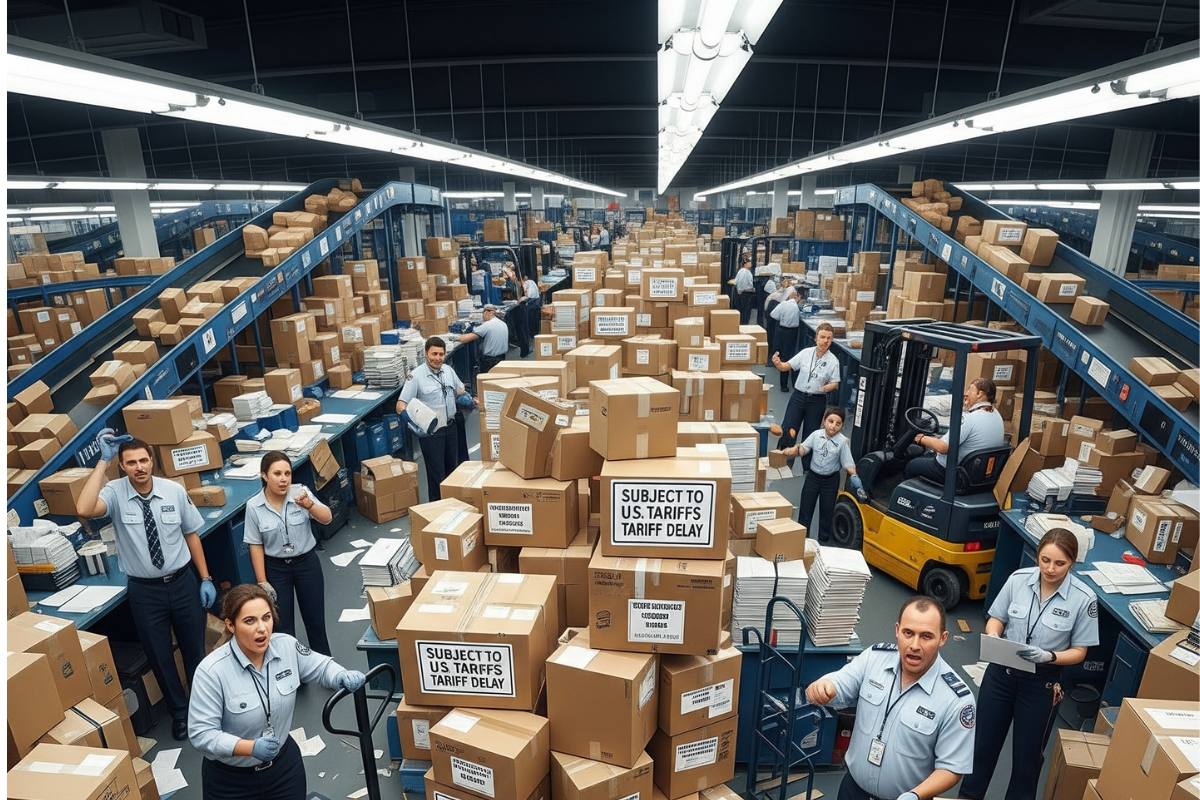A massive disruption is rippling across the Atlantic, severing a vital artery of e-commerce and personal connections. In a startling and coordinated move, national postal services across Europe have abruptly suspended package shipments to the United States, leaving businesses and consumers on both continents in a state of bewilderment.
The cause? A sudden and chaotic change in U.S. trade policy.

Effective this week, the long-standing “de minimis” exemption, which for years allowed packages valued under $800 to enter the U.S. without tariffs or taxes, has been eliminated by an executive order from the Trump administration. And here’s the kicker: European postal operators say the U.S. has no effective system in place to handle the fallout.
This move has triggered a full stop on shipments from major economic hubs, including Germany, France, the United Kingdom, and Italy, as postal services refuse to send goods into a system they describe as unprepared and unclear. The result is a logistical logjam of unprecedented scale, with a ticking clock set to August 29, the date the new rules formally take effect.
A Sudden Stop: The Wave of Suspensions Across Europe
The announcements came in a rapid cascade, a domino effect of trade paralysis. One by one, Europe’s most prominent postal carriers declared they were hitting the brakes on U.S.-bound parcels. It’s not a slowdown; for many, it’s a complete halt.
Belgium’s Bpost was one of the first, ceasing parcel shipments on Friday. They weren’t alone for long. Over the weekend, a slew of others followed suit:
- Germany’s Deutsche Post
- Italy’s Poste Italiane
- Sweden’s PostNord
- Denmark’s national postal service
All of them announced an immediate pause on shipping most merchandise to the U.S. The wave continued to swell, with France’s La Poste and Austria’s postal service slating their own suspensions for Monday, while the U.K.’s Royal Mail set its deadline for Tuesday, a last-ditch effort to get packages into the U.S. before the tariff wall officially goes up.
The message from these operators was unified and blunt: the situation is untenable. DHL, a global logistics titan and Europe’s largest shipping company, captured the collective anxiety in a stark statement. The company explained that “key questions remain unanswered, especially regarding the collection of customs duties in the future, the additional information required, and the process for transmitting data to U.S. Customs and Border Protection”.
Because of this profound uncertainty, DHL announced it would “no longer accept and transport parcels and postal items from business customers destined for the U.S.” starting Saturday.
Funny thing is, it’s not just Europe. Postal services in Asia and the Pacific are also reportedly planning to suspend deliveries. This is a global reaction to a unilateral American policy shift. Even mail that doesn’t contain merchandise is being scrutinized. Poste Italiane clarified that while letters would still be accepted, they would be “compelled, like other postal operators, to temporarily suspend all shipments containing goods for the United States”.
The Eye of the Storm: What Was the ‘De Minimis’ Rule?
So, what is this rule that has caused such international commercial chaos? The policy at the heart of this crisis is known as the “de minimis” exemption. The name comes from a Latin legal phrase, de minimis non curat lex, meaning “the law does not concern itself with trifles.”
For years, this principle governed low-value imports into the United States. It allowed packages with a declared value of less than $800 to pass through customs without incurring any duties, taxes, or extensive paperwork. Think of it as an express lane for small-scale e-commerce.
And it was a busy lane, to say the least.
The scale of trade that flowed through this exemption is staggering. According to U.S. Customs and Border Protection, in 2024 alone, a colossal 1.36 billion packages, that’s billion with a ‘b’, were shipped to the U.S. under this rule. The total value of these goods was an eye-watering $64.6 billion.
This provision was the bedrock of the modern direct-to-consumer marketplace. It allowed American shoppers to buy unique goods directly from small businesses in Europe, and for families to send gifts without navigating a bureaucratic maze. It fueled a vibrant ecosystem of transatlantic trade, one that has now been thrown into jeopardy.
The Trump administration, however, views the exemption differently. President Trump has framed his termination as part of a broader strategy to combat the shipment of illicit drugs and, perhaps more pointedly, to level the economic playing field. The move is consistent with the administration’s aggressive trade posture, which has prioritized tariffs as a tool for economic policy. The duty-free exemption for goods from China was already ended in May, part of a stated effort to discourage Americans from buying low-cost Chinese products. Now, that same logic is being applied globally.
The Unspoken Problem: A System Not Ready for Impact
Here’s the heart of the matter, the real reason for the sudden halt. It’s not just that European companies object to the new tariffs; it’s that they believe the U.S. lacks the fundamental infrastructure to collect them.
You see, the old system was simple and elegant. A package sent from France, for instance, would be processed by La Poste, flown to the U.S., and handed off to the United States Postal Service (USPS) for final delivery. It was seamless. The de minimis rule meant that for the vast majority of these parcels, U.S. Customs was a brief, uncomplicated checkpoint.
But that’s all changed. Now, every package, regardless of its value, is potentially subject to a tariff. And according to European postal operators, the USPS has no system in place to identify, assess, and collect these new duties on the millions of small shipments that arrive every day.
Wout Witteveen, a spokesperson for PostNL in the Netherlands, put it plainly, stating that the Trump administration is pushing ahead with the new duties even though “U.S. authorities do not have a system in place to collect them”. He added that PostNL is working with American counterparts to find a solution, but the clock is ticking. His advice to Dutch citizens was urgent: “If you have something to send to America, you should do it today”.
France’s La Poste echoed this sentiment, expressing deep frustration with the lack of preparation time. “Despite discussions with U.S. customs services, no time was provided to postal operators to reorganize and assure the necessary computer updates to conform to the new rules,” the service said in a statement.
It’s a logistical nightmare. All of these packages, from a $50 sweater bought from a boutique in Milan to a $200 collectible from a German hobby shop, must now theoretically be routed through and cleared by a U.S. Customs agency that is not geared up for this massive new workload. Without clear policies and functioning systems, European carriers are refusing to send packages into a black hole of uncertainty, fearing they will face backlogs, bottlenecks, returns, or even outright losses.
Björn Bergman, head of communications for the Nordic logistics firm PostNord, called the suspension “unfortunate but necessary,” a move required to ensure compliance with regulations that are, by all accounts, not yet fully understood or implementable.
The Human Cost: Ripples Felt by Small Businesses and Everyday People
Beyond the high-level logistics and trade policy, this disruption hits home for ordinary people. It’s a crisis with a very human face.
Consider the small business owner. An artisan in Spain who sells handcrafted leather goods to American customers on Etsy. A German company that manufactures life-saving medical devices and relies on shipping replacement parts to U.S. hospitals within 24 hours. Or a British family wanting to send birthday and Christmas presents to their relatives in the States.
For them, this isn’t an abstract trade dispute; it’s a direct threat to their livelihood and their relationships.
The new rules are not just about a halt in service; they’re about new costs. The U.K.’s Royal Mail has stated that under the new regime, any item sent from the U.K. valued at over $100, including gifts, will be subject to a 10% duty. A recent trade agreement between the U.S. and the European Union adds another layer, imposing a 15% tariff on most products shipped from the EU, a tariff that now extends to these small packages.
The frustration is palpable. One person commented online about the irony of the situation: “It’s frustrating that while wealthy individuals and large corporations manage to avoid taxes, I’m left to cover these costs on gifts for Christmas and birthdays from my family in the U.K”. Another noted that purchasing second-hand items from EU sellers was already difficult, and this new mess will likely take years to sort out.
The impact on business is just as severe. One employee of a German medical device firm described their predicament with grave concern. While their company maintains parts warehouses in the U.S., they sometimes run low and rely on emergency shipments from Germany. A 24-hour turnaround for a critical part, once considered the slow option, now seems impossibly fast as the supply chain grinds to a halt. The sentiment among American companies that collaborate with European firms is one of alarm, with many doubting that the situation can persist for long without causing serious damage.
A Game of Chicken: The Diplomatic and Economic Fallout
This isn’t just a postal problem; it’s a diplomatic and economic standoff. The unilateral U.S. action has been met with a unified and equally unilateral response from European operators. It’s a high-stakes game of chicken being played out across the global supply chain.
PostEurop, a trade association that represents 51 public postal operators across Europe, has issued a stark warning. If a workable solution isn’t found by the August 29 deadline, it’s likely that all of its members will follow suit and suspend services. This would represent a near-total shutdown of public mail services for goods between Europe and the United States.
The move is seen by many as a self-inflicted economic wound. It erects a significant barrier to trade not with a geopolitical rival, but with America’s closest allies. The timing is especially pointed, coming after a U.S.-EU trade agreement had already established new tariffs. The decision to now apply these to low-value shipments feels to many in Europe like adding insult to injury.
Believe it or not, some carriers are taking a different, riskier approach. Ireland’s An Post, for instance, has announced it will continue dispatching small packages for now. Its strategy? To wait and see how USPS and U.S. Customs handle the duty payments from recipients on the other side. It’s a bold gamble, one that could see many of those packages making a long, expensive trip back across the Atlantic if the system fails.
What Happens Next? A Ticking Clock and a Cloud of Uncertainty
With the August 29 deadline looming, the trillion-dollar question is: what happens next?
Right now, the situation is defined by frantic, last-minute talks. Postal operators say they are in close contact with their U.S. counterparts, desperately searching for a solution that would allow the flow of goods to resume. But with so little time left, the prospects for a clean resolution seem dim.
Several scenarios could play out:
- A Last-Minute Reprieve: The U.S. could announce a delay in the implementation of the new rules, buying time to develop the necessary collection systems and provide clarity to international partners. This would be the simplest, but perhaps least likely, outcome given the administration’s firm stance.
- A Patchwork System: The U.S. could scramble to implement a makeshift solution, one that would likely be inefficient, confusing, and lead to significant delays and lost packages. This would do little to restore the confidence of European carriers.
- A Shift to Private Carriers: With public postal services on hold, shipping may shift entirely to private couriers like DHL Express, FedEx, and UPS. While these services have more robust customs brokerage systems, they come at a significantly higher cost, effectively pricing out small businesses and individual consumers. Poste Italiane has already noted that services like DHL Express will continue to operate.
- A Prolonged Stalemate: The most damaging scenario would be a protracted standoff, where shipments remain suspended for weeks or even months. This would sever countless supply chains, devastate small e-commerce businesses, and strain diplomatic relations.
For now, the future of transatlantic mail remains shrouded in uncertainty. A policy intended to protect American interests has, in the short term, cut America off from its allies. Businesses are in limbo, consumers are frustrated, and a multi-billion-dollar trade channel has been frozen in place, all because of a rule change the system wasn’t ready to handle. The world is now watching to see if the gears of global commerce can be restarted, or if this is the new, fractured normal.






















